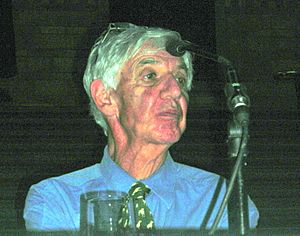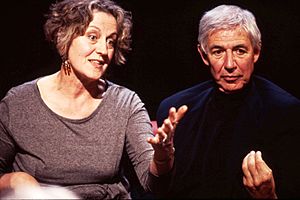Lewis Wolpert facts for kids
Quick facts for kids
Lewis Wolpert
|
|
|---|---|
 |
|
| Born | 19 October 1929 |
| Died | 28 January 2021 (aged 91) |
| Nationality | British |
| Education | University of Witwatersrand (BSc) Imperial College London King's College London (PhD) |
| Known for | Positional-value concept in biological development French flag model |
| Children | Daniel Mark Wolpert, Miranda Wolpert |
| Awards | Hamburger prize for education – American Soc.Dev.Biol. Michael Faraday Prize (2000) Royal Medal (2018) |
| Scientific career | |
| Fields | Developmental biology |
| Institutions | University College London (Emeritus Professor of Cell and Developmental Biology) |
| Doctoral students | Jim Smith |
Lewis Wolpert CBE FRS FRSL FMedSci (born 19 October 1929 – died 28 January 2021) was a scientist from South Africa who later became British. He studied how living things develop from tiny cells. He was also a writer and often talked about science on TV and radio.
Wolpert was famous for his "French flag model." This idea helps explain how cells in a growing embryo know where they are and what they should become. He used the French flag as a simple way to show how cells get signals about their position. These signals tell them what job to do as an animal or plant grows.
He also wrote several science books. Some of his well-known books include Triumph of the Embryo (1991) and How We Live And Why We Die: The Secret Lives of Cells (2009).
Contents
Early Life and Education
Lewis Wolpert was born in Johannesburg, South Africa, on October 19, 1929. His family was Jewish and originally from Lithuania. His father managed a bookshop.
His aunt, Helen Suzman, was a famous South African activist. She worked hard to fight against apartheid, which were unfair laws that separated people based on their race.
Wolpert first studied civil engineering at the University of the Witwatersrand in Johannesburg. There, he learned about progressive politics and even met Nelson Mandela in 1952. After working in South Africa and Israel, he moved to London. He studied soil mechanics at Imperial College London and later earned his PhD from King's College London.
Career and Scientific Discoveries
Wolpert changed his focus from engineering to studying how cells divide. A friend from South Africa suggested this new path. He worked on measuring the forces involved when cells split.
He taught at King's College London and later became a professor at University College London. He retired when he was 74 years old. In 2002, he was chosen to be a member of the American Philosophical Society.
The French Flag Model
Wolpert is best known for his "French flag model" of how embryos develop. He first shared this idea in a science paper in 1969. The model uses the French flag to show how cells in an embryo get information about their position.
Imagine an embryo as a French flag. Cells at one end might become "blue" (one type of tissue), cells in the middle become "white" (another type), and cells at the other end become "red" (a third type). Even if parts of the embryo are removed, the remaining cells can still form the correct pattern. This is because they get signals that tell them where they are and what their role should be.
This model helped scientists understand how cells communicate early in development. It was based on Wolpert's research on sea urchin eggs. He famously said, "It is not birth, marriage, or death, but gastrulation which is truly the most important time in your life." Gastrulation is an early stage where an embryo's basic body plan is set up.
Wolpert's ideas about "positional information" and "positional value" are very important in biology. These ideas suggest that cells receive specific signals that tell them what to do and where to be during development. Later discoveries, like the Hox genes, supported his ideas.
Wolpert's Views on Science
Lewis Wolpert believed that everyone should understand how cells work. He said that humans are like a "society of cells." He thought this understanding could help people learn about illnesses like cancer or Alzheimer's disease.
He also discussed big questions like the origin of the first cell. Wolpert believed that science should always be free to explore and understand the world. He said, "I regard it as ethically unacceptable and impractical to censor any aspect of trying to understand the nature of our world."
Wolpert often took part in public discussions about science and religion. He was an atheist, meaning he did not believe in God. He also discussed topics like telepathy and the possibility of creating a computer model of a cell.
Books and Media Appearances

In the early 1980s, Lewis Wolpert started talking about science on BBC Radio 3 and BBC Radio 4. He later wrote many popular science books. These include The Unnatural Nature of Science (1994) and How We Live And Why We Die: The Secret Lives of Cells (2009).
He also wrote a book called Malignant Sadness (1999) about his own experiences with depression. He even presented three TV shows based on this book for BBC Two.
In 2011, Wolpert published You're Looking Very Well, a book about aging. However, this book was later removed from sale because it contained parts copied from other sources without proper credit. Wolpert apologized for these errors, saying they were "totally inadvertent and due to carelessness."
Awards and Recognition
Wolpert received many honors for his work.
- He became a Fellow of the Royal Society in 1980.
- He was awarded the CBE in 1990.
- He became a Fellow of the Royal Society of Literature in 1999.
- He was one of the first Fellows of the Academy of Medical Sciences in 1998.
- In 1986, he gave the famous Royal Institution Christmas Lectures for young people.
- He received the Michael Faraday Prize for science communication in 2000.
- In 2018, he was awarded the Royal Medal.
Personal Life
Lewis Wolpert was married three times. His first marriage was to Elizabeth Brownstein, which ended in divorce. He then married Australian writer Jill Neville, who passed away from cancer in 1997. In 2016, he married Alison Hawkes.
He had four children, including Miranda Wolpert and Daniel Wolpert, who are both professors in science.
Lewis Wolpert died on January 28, 2021, at the age of 91. He passed away due to problems related to COVID-19.
See also
 In Spanish: Lewis Wolpert para niños
In Spanish: Lewis Wolpert para niños
 | Chris Smalls |
 | Fred Hampton |
 | Ralph Abernathy |

